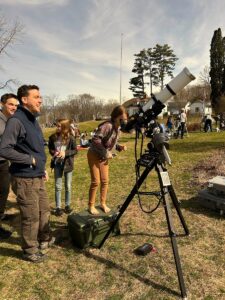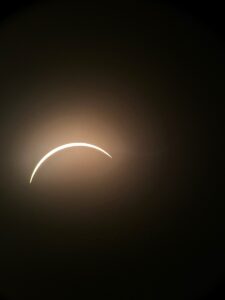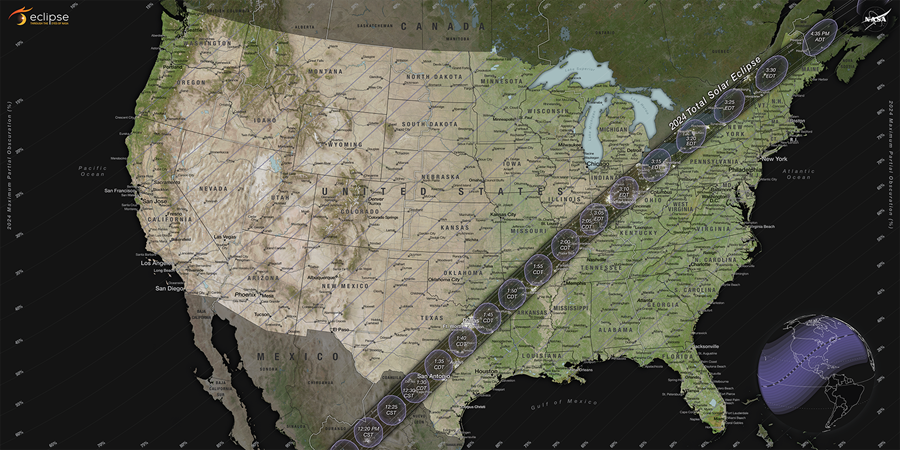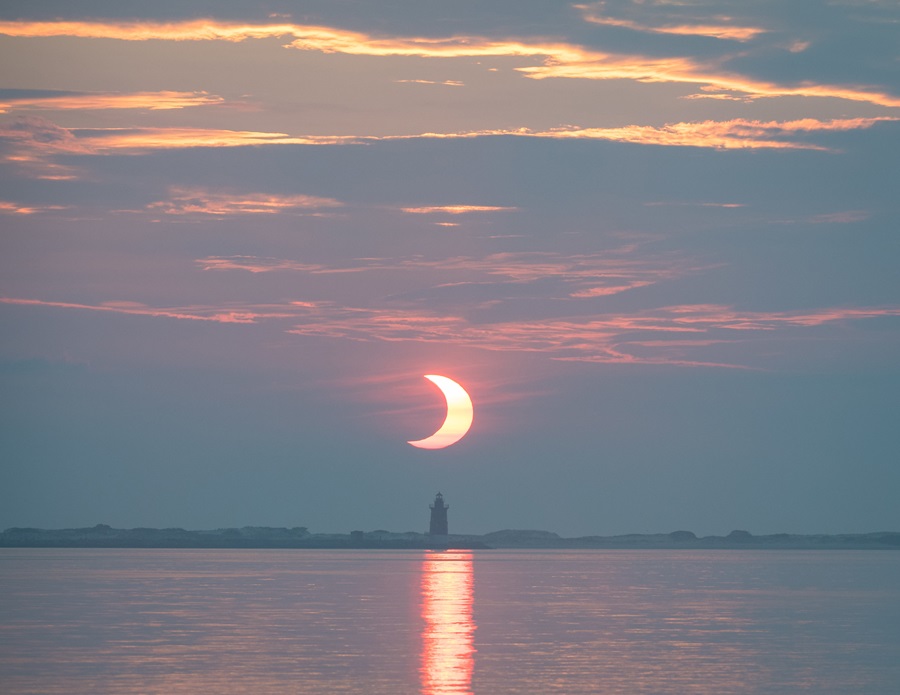Last month I watched the solar eclipse from a park in Westport, N.Y. by Lake Champlain. The lake and mountains beyond were a beautiful sight — a proper setting for the spectacle of totality. Hundreds of other people seemed to agree; the park was crowded.
Days before our arrival there, the sheriff of an upstate county had warned in a press conference that he expected hundreds of thousands of people on the move on April 8, converging on the path of totality. Some official estimates had predicted millions would be traveling across North America to intercept the 122-mile-wide shadow of the Moon as it sped from western Mexico to eastern Canada at over 1,000 miles per hour.

As a street astronomer, I’ve set up my telescope at beaches and piers, in parks and back yards, and on urban and suburban sidewalks. I’ve set up for comets, conjunctions, transits, lunar eclipses, and partial solar eclipses. But I had never set up for this — a total solar eclipse.
I felt fortunate to be with friends and family that day. But the big crowd, something I normally dislike, didn’t bother me. Instead, I felt a camaraderie with these strangers.
That feeling had begun hours earlier as we crawled up Interstate 87 from New York City. The drive felt like something out of a disaster movie: packed cars crowding the roads with everyone heading in the same direction and the uneasy feeling that the others were competitors.
But we were heading toward something wonderful, not fleeing zombies. And the other cars weren’t really our competition, though their presence slowed us (just as ours slowed them). I wanted all of us to get to Vermont on time. After all, everyone was making the effort to see something special, taking time from work, spending money on gas. I felt sorry for the people slowed by flat tires, though we didn’t stop for them: that would have meant missing the eclipse.

At the park by the lake, there were small groups of friends but also lots of people who were strangers to each other, mingling and talking. I felt the absurd urge to cheerfully greet everyone I saw like an exuberant three-year-old. It was like being outside the venue where your favorite band was playing. We were all there for the same show, all fans of the natural world that afternoon.
Once the solar filter was secure on my telescope, I invited people to look. Others saw the growing line at the telescope and came over. We watched the Moon slowly devour the Sun and talked about how far we had traveled. Some watchers lived in town or nearby. Others, like me, had come from far away. Around us the light transformed, taking on a golden hue, then pale silver. Suddenly it was cold. Shadows took on sharp edges. I felt as if I were standing on a planet in a science fiction movie.

It happened quickly. The Sun, a beautiful thin crescent in the telescope but still a bright light in the sky, vanished. Something terrible and wonderful took its place. For the next two minutes and forty-eight seconds we could gaze with unprotected eyes at a dark sun set against a dark sky: the black disk of the Moon covering the Sun’s surface. Deep twilight fell. In all directions the horizon glowed red like sunset.
People shouted and cried out. The corona was visible: the Sun’s atmosphere, ghostly white tendrils of plasma surrounding a jet-black circle, beautiful and menacing.
Two minutes. “I’m afraid,” I thought, laughing to myself. “I’m actually afraid.”

One minute. I thought of my daughters at college in Ohio, directly under the path of totality, celebrating with their friends. My teenage son had stayed at home, outside totality — I regretted not insisting that he come along.
Ten seconds. A chill wind blew from over the lake. “Look away!” I said. Others took up the warning. “Look away! Look away!”
All at once it ended. The dark Sun was gone and the true Sun returned, familiar and blinding. We turned to each other, friends and strangers, laughing.
“Amazing. Beautiful. Terrifying. Wonderful.” But even as we said these words we shook our heads. None was quite right.
The park slowly emptied as the world returned to normal. People waved goodbye to those they had just met. And with the return of color and warmth, the camaraderie of the day waned. The eclipse that had brought us all together had ended. All that remained was the long drive home and the memory of an experience beyond words, shared with a few hundred friends.


